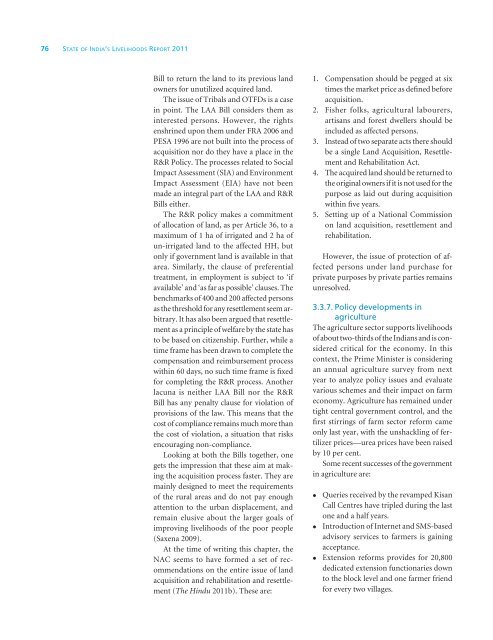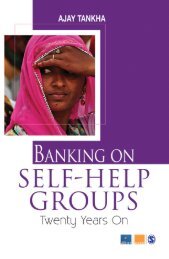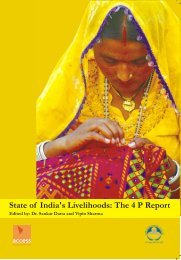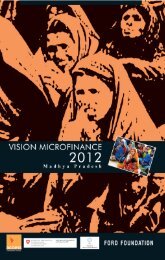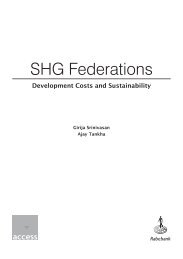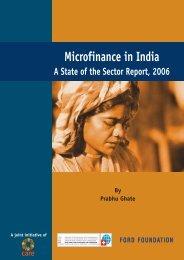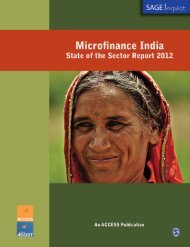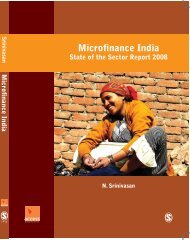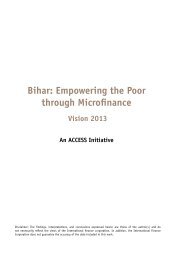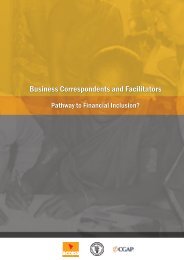SOIL Report 2011 - ACCESS Development Services
SOIL Report 2011 - ACCESS Development Services
SOIL Report 2011 - ACCESS Development Services
- No tags were found...
Create successful ePaper yourself
Turn your PDF publications into a flip-book with our unique Google optimized e-Paper software.
76 State of India’s Livelihoods <strong>Report</strong> <strong>2011</strong>Bill to return the land to its previous landowners for unutilized acquired land.The issue of Tribals and OTFDs is a casein point. The LAA Bill considers them asinterested persons. However, the rightsenshrined upon them under FRA 2006 andPESA 1996 are not built into the process ofacquisition nor do they have a place in theR&R Policy. The processes related to SocialImpact Assessment (SIA) and EnvironmentImpact Assessment (EIA) have not beenmade an integral part of the LAA and R&RBills either.The R&R policy makes a commitmentof allocation of land, as per Article 36, to amaximum of 1 ha of irrigated and 2 ha ofun-irrigated land to the affected HH, butonly if government land is available in thatarea. Similarly, the clause of preferentialtreatment, in employment is subject to ‘ifavailable’ and ‘as far as possible’ clauses. Thebenchmarks of 400 and 200 affected personsas the threshold for any resettlement seem arbitrary.It has also been argued that resettlementas a principle of welfare by the state hasto be based on citizenship. Further, while atime frame has been drawn to complete thecompensation and reimbursement processwithin 60 days, no such time frame is fixedfor completing the R&R process. Anotherlacuna is neither LAA Bill nor the R&RBill has any penalty clause for violation ofprovisions of the law. This means that thecost of compliance remains much more thanthe cost of violation, a situation that risksencouraging non-compliance.Looking at both the Bills together, onegets the impression that these aim at makingthe acquisition process faster. They aremainly designed to meet the requirementsof the rural areas and do not pay enoughattention to the urban displacement, andremain elusive about the larger goals ofimproving livelihoods of the poor people(Saxena 2009).At the time of writing this chapter, theNAC seems to have formed a set of recommendationson the entire issue of landacquisition and rehabilitation and resettlement(The Hindu <strong>2011</strong>b). These are:1. Compensation should be pegged at sixtimes the market price as defined beforeacquisition.2. Fisher folks, agricultural labourers,artisans and forest dwellers should beincluded as affected persons.3. Instead of two separate acts there shouldbe a single Land Acquisition, Resettlementand Rehabilitation Act.4. The acquired land should be returned tothe original owners if it is not used for thepurpose as laid out during acquisitionwithin five years.5. Setting up of a National Commissionon land acquisition, resettlement andrehabilitation.However, the issue of protection of affectedpersons under land purchase forprivate purposes by private parties remainsunresolved.3.3.7. Policy developments inagricultureThe agriculture sector supports livelihoodsof about two-thirds of the Indians and is consideredcritical for the economy. In thiscontext, the Prime Minister is consideringan annual agriculture survey from nextyear to analyze policy issues and evaluatevarious schemes and their impact on farmeconomy. Agriculture has remained undertight central government control, and thefirst stirrings of farm sector reform cameonly last year, with the unshackling of fertilizerprices—urea prices have been raisedby 10 per cent.Some recent successes of the governmentin agriculture are:• Queries received by the revamped KisanCall Centres have tripled during the lastone and a half years.• Introduction of Internet and SMS-basedadvisory services to farmers is gainingacceptance.• Extension reforms provides for 20,800dedicated extension functionaries downto the block level and one farmer friendfor every two villages.


